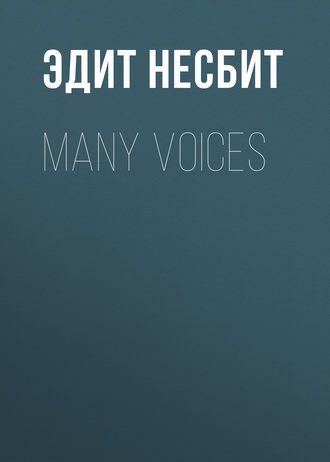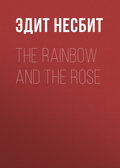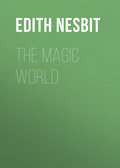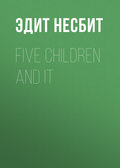полная версия

Эдит Несбит
Many Voices
MARY OF MAGDALA
Mary of Magdala came to bed;
There were no soft curtains round her head;
She had no mother to hold of worth
The little baby she brought to birth.
Mary of Magdala groaned and prayed:
“O God, I am very much afraid;
For out of my body, by sin defiled,
Thou biddest me make a little child.
“O God, I have turned my face from Thee
To that which the angels may not see;
How can I make, from my deep disgrace,
A child whose angel shall see Thy face?
“O God, I have sinned, and I know well
That the pains I bear are the pains of hell;
But the thought of the child that sin has given
Is like the thought of the airs of Heaven.”
Mary of Magdala held her breath
In the clutch of pain like the pains of Death,
And through her heart, like the mortal knife,
Went the pang of joy and the pang of life.
“We two are two alone,” said she,
“And we are two who should be three;
Now who will clothe my baby fair
In the little garments that babies wear?”
There came two angels with quiet wings
And hands that were full of baby things;
And the new-born child was bathed and dressed
And laid again on his mother’s breast.
“Now who will sign on his brow the mark
To keep him safe from the Powers of the Dark?
Who will my baby’s sponsor be?”
“I, the Lord God, who died for thee.”
“Now who will comfort him if he cry;
And who will suckle him by and bye?
For my hands are cold and my breasts are dry,
And I think that my time has come to die.”
“I will dandle thy son as a mother may;
And his lips shall lie where my own Son’s lay.
Come, dear little one, come to me;
The Mother of God shall suckle thee.”
Mary of Magdala laughed and sighed;
“I never deserved a child,” she cried.
“Dear God, I am ready to go to hell,
Since with my little one all is well.”
Then the Son of Mary did o’er her lean.
“Poor mother, thy tears have washed thee clean.
Thy last poor pains, they will soon be done,
And My Mother shall give thee back thy son.”
Frozen grass for a bearing bed,
A halo of frost round a woman’s head,
And pious folks who looked and said:
“A drab and her brat that are better dead.”
THE HOME-COMING
This was our house. To this we came
Lighted by love with torch aflame,
And in this chamber, door locked fast,
I held you to my heart at last.
This was our house. In this we knew
The worst that Time and Fate can do.
You left the room bare, wide the door;
You did not love me any more.
Where once the kind warm curtain hung
The spider’s ghostly cloth is flung;
The beetle and the woodlouse creep
Where once I loved your lovely sleep.
Yet so the vanished spell endures,
That this, our house, still, still is yours.
Here, spite of all these years apart,
I still can hold you to my heart!
AGE TO YOUTH
Sunrise is in your eyes, and in your heart
The hope and bright desire of morn and May.
My eyes are full of shadow, and my part
Of life is yesterday.
Yet lend my hand your hand, and let us sit
And see your life unfolding like a scroll,
Rich with illuminated blazon, fit
For your arm-bearing soul.
My soul bears arms too, but the scroll’s rolled tight,
Yet the one strip of faded brightness shown
Proclaims that when ’twas splendid in the light
Its blazon matched your own.
IN AGE
The wine of life was rough and new,
But sweet beyond belief,
And wrong was false, and right was true—
The rose was in the leaf.
In that good sunlight well we knew
The hues of wrong and right;
We slept among the roses through
The long enchanted night.
Now to our eyes, made dim with years,
Right intertwines with wrong.
How can we hear, with these tired ears,
The old, the magic song?
But this we know—wine once was red,
Roses were red and dear;
Once in our ears the truths were said
That now the young men hear!
WHITE MAGIC
This is the room to which she came,
And Spring itself came with her;
She stirred the fire of life to flame,
She called all music hither.
Her glance upon the lean white walls
Hung them with cloth of splendour,
And still the rose she dropped recalls
The graces that attend her.
The same poor room, so dull and bare
Before, in consecration,
She breathed upon its common air
The true transfiguration . . .?
This room the same to which she came
For one immortal minute?—
How can it ever be the same
Since she has once been in it!
FROM THE PORTUGUESE
I
When I lived in the village of youth
There were lilies in all the orchards,
Flowers in the orange-gardens
For brides to wear in their hair.
It was always sunshine and summer,
Roses at every lattice,
Dreams in the eyes of maidens,
Love in the eyes of men.
When I lived in the village of youth
The doors, all the doors, stood open;
We went in and out of them laughing,
Laughing and calling each other
To shew each other our fairings,
The new shawl, the new comb, the new fan,
The new rose, the new lover.
Now I live in the town of age
Where are no orchards, no gardens.
Here, too, all the doors stand open,
But no one goes in or goes out.
We sit alone by the hearthstone
Where memories lie like ashes
Upon a hearth that is cold;
And they from the village of youth
Run by our doorsteps laughing,
Calling, to shew each other
The new shawl, the new comb, the new fan,
The new rose, the new lover.
Once we had all these things—
We kept them from the old people,
And now the young people have them
And will not shew them to us—
To us who are old and have nothing
But the white, still, heaped-up ashes
On the hearth where the fire went out
A very long time ago.
II
I had a mistress; I loved her.
She left me with memories bitter,
Corroding, eating my heart
As the acid eats into the steel
Etching the portrait triumphant.
Intolerable, indelible,
Never to be effaced.
A wife was mine to my heart,
Beautiful flower of my garden,
Lily I worshipped by day,
Scented rose of my nights.
Now the night wind sighing
Blows white rose petals only
Over the bed where she sleeps
Dreamless alone.
I had a son; I loved him.
Mother of God, bear witness
How all my manhood loved him
As thy womanhood loved thy Son!
When he was grown to his manhood
He crucified my heart,
And even as it hung bleeding
He laughed with his bold companions,
Mocked and turned away
With laughter into the night.
Those three I loved and lost;
But there was one who loved me
With all the fire of her heart.
Mine was the sacred altar
Where she burnt her life for my worship.
She was my slave, my servant;
Mine all she had, all she was,
All she could suffer, could be.
That was the love of my life,
I did not say, “She loves me”;
I was so used to her love
I never asked its name,
Till, feeling the wind blow cold
Where all the doors were left open,
And seeing a fireless hearth
And the garden deserted and weed-grown
That once was full of flowers for me,
I said, “What has changed? What is it
That has made all the clocks stop?”
Thus I asked and they answered:
“It is thy mother who is dead.”
And now I am alone.
My son, too, some day will stand
Here, where I stand and weep.
He too will weep, knowing too late
The love that wrapped round his life.
Dear God spare him this:
Let him never know how I loved him,
For he was always weak.
He could not endure as I can.
Mother, my dear, ask God
To grant me this, for my son!
THE NEST
That was the skylark we heard
Singing so high,
The little quivering bird
We saw, and the sky.
The earth was drenched with sun,
The sky was drenched with song;
We lay in the grass and listened,
Long and long and long.
I said, “What a spell it is
Has made her rise
To pour out her world of bliss
In that world of skies!”
You said, “What a spell must pass
Between sky and plain,
Since she finds in this world of grass
Her nest again!”
THE OLD MAGIC
Gray is the sea, and the skies are gray;
They are ghosts of our blue, bright yesterday;
And gray are the breasts of the gulls that scream
Like tortured souls in an evil dream.
There is white on the wings of the sea and sky,
And white are the gulls’ wings wheeling by,
And white, like snow, is the pall that lies
Where love weeps over his memories.
For the dead is dead, and its shroud is wrought
Of good unfound and of wrong unsought;
Yet from God’s good magic there ever springs
The resurrection of holy things.
See—the gold and blue of our yesterday
In the eyes and the hair of a child at play;
And the spell of joy that our youth beguiled
Is woven anew in the laugh of the child.







